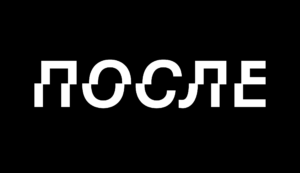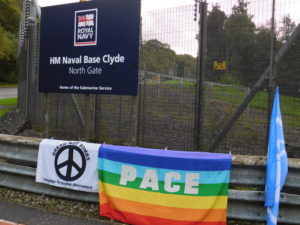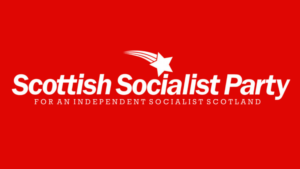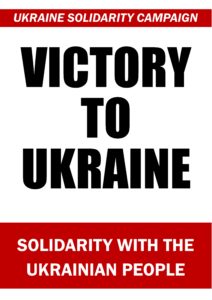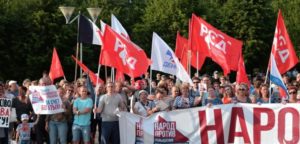Statement of the Fourth International Executive Bureau, 24 May 2022
1. State of the war
. Today, three months have passed since the invasion of Ukraine by Putin’s troops. The Russian army has occupied parts of the territory, particularly in the East and South of the country, while suffering a serious defeat in the region of Kiev.
. Ukrainians have opposed phenomenal and massive resistance, involving armed and non-armed struggle, the army, territorial defence forces, civil society organizations, and new forms of self-organization. They have received arms deliveries, humanitarian aid and intelligence from EU and NATO countries. The first successes of such resistance have radicalized Ukrainian hopes for a defeat of the Russian aggressor. Citizens in occupied regions continue to demonstrate against occupation, there are reports of partisan activities in some areas.
. The soldiers killed on both sides can be counted in tens of thousands, as can Ukrainian civilian victims. The war crimes committed by the Russian forces are multiple and proven, as in Bucha, Irpin and other cities. The siege of the cities by the Russian army has deliberately caused thousands of inhabitants to die of deprivation and starvation, particularly in Mariupol. Twelve million inhabitants have been displaced, five million to other European countries.
. The conflict has caused massive material destruction by indiscriminate bombing of civilian and military areas, some cities have been almost razed to the ground.
. A readjustment of the offensive was decided by Vladimir Putin at the beginning of April, aiming to annex the whole of Donbass and the industrial and port city of Mariupol, as well as the largest possible territory in the south, on the Black Sea. But in these regions also, Ukrainians continue to resist.
2. Our position: support for the Ukrainian struggle for self-determination and independence against a background of inter-imperialist strife.
. Putin’s invasion is a war of aggression, aiming to submit Ukrainian territory to Russian control, as part of the return of a Great Russian imperialist project.
. Ukrainians are fighting a national liberation struggle against the invasion. We support their right to resist, including militarily, and stand in solidarity with their choice to do so. We defend their right to arm themselves and thus to receive the arms necessary to resist against a much more powerful army,
. This war is carried in the context of a renewed inter-imperialist strife. In this war, Western imperialism – represented by NATO and the EU – has taken sides, and is supporting Ukraine’s resistance financially and materially. This has clearly reinforced the resistance and improved its prospects.
. We denounce the obvious aim of US and EU leaders to transform the war according to their own interests: the prospect of a second Afghanistan nightmare for Russia already opens huge opportunities for increased military budgets, the deployment of new military technologies, the expansion of NATO and the improvement of the US world geo-strategic position. They aim to use the battlefield of Ukraine for the realization of their geopolitical goals.
. For now, both imperialist powers, Russia and NATO, have avoided any direct confrontation that could escalate into an inter-imperialist war. No one is interested in such an escalation, but it could be the result of uncontrolled spiralling. Such a scenario of world war is an objective danger in the imperialist phase of capitalism. It would be catastrophic for humanity and the planet, and we oppose any escalation that could transform this war into a direct inter-imperialist confrontation.
. As revolutionaries and internationalists, we affirm that the way out of the logic of inter-imperialist conflict and escalation is the resistance of peoples from below: for self-determination and against foreign invasions. The choice of Ukrainians to resist has blocked the quick annexation that Russia was aiming for. The defeat of the Russian invader at the hands of Ukrainian people would be the best scenario for struggles for self-determination and against imperialisms of all kinds. The reinforcement of the Ukrainian resistance and of anti-war movements in Russia (and Belarus) are two necessary factors for this scenario to be realized.
. Putin’s invasion has provided a huge boost to NATO’s agenda of expansion, with Sweden and Finland requesting their entry. We oppose this dynamic: we reject the logic of military blocks and work for a new trans-European concept of security based on self-determination, egalitarian relations between peoples, including Russia, urgent treaties of denuclearization and the dissolution of NATO and CSTO.
. In the same way, we reject EU treaties and financial institutions and policies, and denounce the way in which they are used to subject countries in Europe’s periphery to neo-colonial relations. The contradictions between the Ukrainian demand for “fast and just” European integration and the reality of the EU’s criteria should help us raise the issue of new treaties for European relations based on cooperation and not market competition, fiscal and social dumping.
. We aim to build a movement from below, for a just and lasting peace, in solidarity with the struggle of Ukrainian and Russian people against Putin’s invasion and NATO strategies, for a just peace and for the self-determination of Ukraine.
. We demand the urgent transfer of military budgets towards the vital needs of an ecosocialist transformation of the world based on social and environmental justice and against all neo-colonial relations.
3. Political trends in Ukraine.
. Zelensky and his government are a neoliberal force, tied to sectors of the Ukrainian oligarchy. His unexpected electoral success in 2019 came on the basis of criticism of corruption and hopes for a peaceful settlement of the hybrid war producing more than 15000 deaths since 2014, and in the context of a deep crisis of all political parties associated with growing social conflicts and activities of the civil society.
. The Ukrainian population is united in resisting the Russian invasion by all means. Many socialist and anarchist militants have joined the Territorial Defense forces. As internationalist militants, we support comrades who have made this choice.
. At the same time, Ukrainians are self-organizing to provide support for victims of the war. Popular initiatives have been launched to provide shelters, social housing and childcare for refugees and internally displaced people, to provide free mental and other health care, transport and much else. These initiatives are an experiment in new ways of social organization, which could break with the neoliberal regression of the last 20 years; but they are still confronted with the dominant political and economic regime which protects oligarchs.
. In the current stage of the war, it is Russian-speaking Ukrainians that are suffering the most at the hands of the Russian army. They are massively engaged in the armed and civilian resistance. This debunks any claim by Putin that the “operation” aims to protect national minorities. We support the right of populations to democratic self-determination in the absence of national or foreign coercion.
. The building of a Ukrainian national identity is a dominant political trend, a historically progressive resistance against centuries of Russian domination. This sentiment has also often taken the color of anti-communism, also due to oppression during the USSR period. This can only be overcome by a radical democratic movement to consolidate a peaceful Ukraine. The popular resistance and victory against Russian national oppression should allow for a collective appropriation of conflicting interpretations of black pages of Ukrainian history by historians and different political currents, dealing with all past oppressions and crimes. But that also needs the consolidation of a post-war Ukraine free of oligarchic capitalism and socially destructive policies.
. It is clear that the context of violence and increased national sentiment provoked by the invasion is favourable to “anti-Russian” and far-right nationalist ideology. At the same time, the massive engagement of Russian-speaking Ukrainians and Rroms in defence of the country, as well as the direct mobilization of the citizens in armed and unarmed resistance, creates potential for a more progressive resolution of the cultural and linguistic issues that have been exploited by the far right in recent years.
. Many women have volunteered for armed service. As Ukrainian feminists say, they know what kind of future Putin’s regime offers to feminists and LGBT. That is why their first choice is to fight for his defeat.
. In the context of war and bellicism, the gender regime tends to shift to more patriarchal forms, which place women in the field of care and men in the frontline and increases sexist, violent and reactionary behaviours (against women and LGBT). Since 2014, the burden of social reproduction in a deeply neoliberal society has fallen more and more on women as social provision has been stripped away. This is a part of the context for the massive surrogacy industry that has developed in Ukraine. Since the Russian invasion the use of rape and sexual violence as war weapons has left women with traumatic after-effects, including unwanted pregnancies, for which they cannot access appropriate care. We support the feminist collectives that are working to help women in all the complex trauma they are facing.
. It is in such a context that the new socialist NGO Sotsialnyi Rukh (“Social Movement”) was established. We support their orientation, which includes their open criticisms of wartime emergency measures and labour law reforms that make it easier to dismiss workers, non-enforcement of labour law, and a corrupt legal system and civil service which enables oligarchs and other capitalists to avoid paying wages and taxes or respecting environmental legislation. They are building a popular resistance against the invader which is rooted in solidarity with workers’ struggles and egalitarian (feminist, anti-racist, anti-sexist) relations amongst the people. They are promoting an important campaign for the cancellation of Ukraine’s external debt.
. Independent workers’ unions are also a key factor in building resistance as well as an alternative to the bourgeois and neo-liberal project for Ukraine.
. The links of these progressive forces (in particular trade unions and feminists) with the anti-war movement in Russian and Belarus will be essential to open progressive alternatives to the dominant inter- imperialist conflicts and settlements.
4. The political climate in Russia and the anti war movement
. The reactivation of Great Russian imperialism has also political consequences within the Russian state. Putin is also taking advantage of his Orwellian “special operation” to further stifle Russian society. His policy is as much aggressively ideological (Great Russian nationalist and “anti-Nazi”) as it is systematically repressive. He wants to put an end to any internal opposition in the long term.
. Education and media have been reformed to promote authoritarian, imperialist values and suppress dissent. Independent labour unions and activist networks, LGBT and environmental activists all face increased repression.
. These regressive tendencies are shifting Russia’s regime into neofascism, in which formal democratic procedures are gradually suppressed.
. Despite this, some sectors of Russian society have shown great courage in opposing Putin’s war. In the initial days of the war, spontaneous demonstrations gathered in many Russian cities to oppose the invasion. These were severely repressed. Individuals continue to protest, and have been fined, imprisoned, and intimidated in their places of work and study.
. Some soldiers are refusing to take part in this so-called “special operation”, and desertion and breaks in discipline afflict the Russian army. Most soldiers serving and dying in Ukraine come from Russia’s ethnic minorities, who have fewer employment opportunities, and are less able to avoid military service.
. Today, the small feminist movement is playing a key role in denouncing the invasion and standing in solidarity with Ukraine, contributing to the coordination of initiatives nation-wide.
. The movement of mothers of soldiers is also an important factor, giving voice to those critical of Putin’s war and propaganda.
. In the meanwhile, sabotage actions, not clearly attributed, are also making it difficult for the Russian state and showing there is more opposition to the war than what is expressed publicly.
. There has also been impressive sabotage of Russian logistics in Belarus. The Minsk regime has reclassified such sabotage as terrorism, carrying the death penalty. Belarus activists are also supporting Russian deserters and demonstrating against Belarus collaboration or future participation in the Russian invasion. Independent trade unions, which have been leading anti-war protests, have been severely repressed, and their ability to function is in question.
. The socialist and revolutionary left in Russia, and in particular the Russian Socialist Movement, have an important role to play, building a militant opposition to the Putin regime, building solidarity links with Ukrainian militants and around the world. They face increasing repression and have to work in a semi-clandestine fashion.
. Some socialists, feminists and other activists have had to leave the country but continue to work from exile to build a radical alternative in Russia. We are committed to supporting them.
5. Our tasks outside Ukraine and Russia.
. As radical left forces, we express and organize our support for Ukrainian armed and unarmed resistance while staying independent from, and critical of our governments and their imperialist programme and motivations. We do not stand in the way of any initiative that helps to reinforce the autonomous resistance of the Ukrainian people.
. We participate in mobilizations in solidarity with Ukrainians and against Putin’s invasion, trying to connect with Ukrainian refugees and people outraged by the aggression, bringing our slogans and ideas against all imperialisms, for socialism and self-determination.
. We support and build initiatives from below that bring material and humanitarian aid to Ukraine.
. We denounce policies that aim to take advantage of Ukraine’s war to further the interests of Western imperialism. We oppose all conditionalities imposed by Western governments in order to make profits and subordinate Ukraine to their economic and military sphere of influence.
. We oppose the rise of military expenditure, part of an agenda of increased militarism that precedes Putin’s invasion. We stand against NATO and CSTO, for their dissolution, for each country to leave these alliances and we resolutely oppose their expansion.
. We express and organize our solidarity with refugees from Ukraine, calling for the end of all discriminations and a policy of open borders for migrants and refugees of all origins. The forced exile of the Ukrainians has been met with a great deal of popular, self-organized solidarity in the neighbouring countries, in particular Poland. The current EU’s treatment of Ukrainian refugees should be adopted as the standard practice for all new asylum seekers.
. We support direct actions taken against Russian oligarchs. They are protected by the opacity and unfairness of the global financial system, bank secrecy and institutionalized capital flight and tax evasion, of which all oligarchies take advantage, including the Ukrainian. We do not support long term sanctions aimed to “bleed” or “weaken” Russia, which result in increased poverty within the Russian population.
. We combat any Russophobia, which conflates Russia’s people or culture with the actions of its government.
. We point out the contradiction between the support for Ukrainian struggle by Western governments and their complicity with Turkey’s oppression of the Kurdish people and Israel’s oppression of the Palestinian people and all other oppressed nations across the world.
6. Our main slogans and demands
. For the defeat of the Russian invasion. Russian troops out of Ukraine.
. Support for Ukrainian resistance, in all its forms.
. For the immediate cancellation of Ukrainian debt.
. Down with Putin! Support the Russian anti-war movement. Solidarity and refugee status for all deserters from the Russian army.
. Against NATO and the Russian-led CSTO expansionism and interventionism. Against all imperialist blocks.
. Solidarity with Ukrainian refugees of all origins, and provision of the practical short and longer-term aid necessary, taking into account the fact that the vast majority are women and children.
. For a transition to renewable energies to end-up with dependencies and blackmails from oil and gas producers. Transfer of military budgets to investment into a quick decarbonization of the economy under popular control.
. For a socialist Europe free of military blocks and all neo colonial relations. For an ecosocialist revolutionary alternative to capitalist exploitation and the destruction of life on our planet.
Reproduced from: https://fourth.international/en/566/europe/447
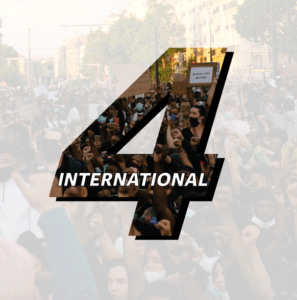 NOTE: The Fourth International is a worldwide organisation of revolutionary ecosocialists. Defending the self-organization of the exploited and oppressed, towards the abolition of capitalism and the building of ecosocialism, the Fourth International brings together organizations convinced that this is not possible without a root and branch, revolutionary, transformation of society. Read more here:
NOTE: The Fourth International is a worldwide organisation of revolutionary ecosocialists. Defending the self-organization of the exploited and oppressed, towards the abolition of capitalism and the building of ecosocialism, the Fourth International brings together organizations convinced that this is not possible without a root and branch, revolutionary, transformation of society. Read more here: 